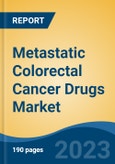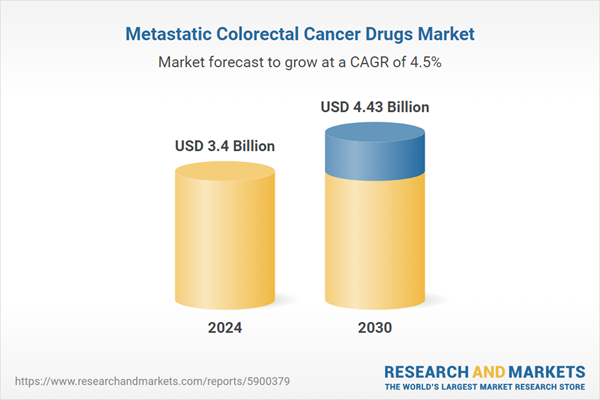Speak directly to the analyst to clarify any post sales queries you may have.
10% Free customizationThis report comes with 10% free customization, enabling you to add data that meets your specific business needs.
One of the key drivers of growth in this market is the rising incidence of colorectal cancer worldwide, particularly in developed nations with aging populations. Early diagnosis and advancements in targeted therapies, immunotherapies, and combination treatments have revolutionized the management of mCRC, leading to increased demand for effective and personalized treatment options. Pharmaceutical companies are at the forefront of research and development in this space, investing heavily in clinical trials and drug discovery to introduce novel therapies with improved efficacy and fewer side effects. Monoclonal antibodies, tyrosine kinase inhibitors, and immunotherapies are some of the innovative approaches that have gained prominence in the treatment of mCRC.
Key Market Drivers
Rising Incidence of Colorectal Cancer & Aging Population
The rising global incidence of colorectal cancer (CRC) is a primary driver of the Global Metastatic Colorectal Cancer (mCRC) Drugs Market. In 2020, the global colorectal cancer burden was significant, with an estimated 1.9 million newly diagnosed cases and over 930,000 fatalities attributed to the disease. These figures underscore the increasing prevalence and mortality rate of colorectal cancer, highlighting the urgent demand for advanced treatment solutions and expanded healthcare interventions in both developed and emerging markets. As the number of diagnosed cases continues to escalate, the demand for advanced treatment options, innovative drug therapies, and improved patient care solutions is rising. This trend is creating significant business opportunities for pharmaceutical companies, biotech firms, and healthcare providers.Key Market Challenges
Late-stage Diagnosis
Metastatic Colorectal Cancer Drugs begins as colorectal cancer but progresses to a stage where cancer cells have spread to other parts of the body, such as the liver, lungs, or distant lymph nodes. The problem often starts with late-stage diagnosis, where patients do not exhibit symptoms until the disease has already advanced.Several factors contribute to the late-stage diagnosis of mCRC. One key factor is the lack of routine screening and awareness. Unlike breast or prostate cancer, colorectal cancer lacks widespread routine screening programs, leading to delayed detection. Moreover, some individuals may avoid seeking medical attention due to embarrassment or fear of invasive procedures associated with colorectal cancer screening. Healthcare disparities also play a role in late-stage diagnosis. Limited access to healthcare services, especially in underserved communities or low-income regions, can lead to delayed diagnosis and treatment initiation. Additionally, healthcare providers may not always consider colorectal cancer as a potential diagnosis, leading to misdiagnoses or delayed referrals to specialists.
Key Market Trends
Advancements in Immunotherapy
Advancements in immunotherapy have emerged as a potent force in the global Metastatic Colorectal Cancer Drugs (mCRC) market, ushering in a new era of hope and promise for patients facing this challenging disease. Immunotherapy, a groundbreaking treatment approach that harnesses the body's own immune system to target and destroy cancer cells, has begun to revolutionize the treatment landscape for mCRC.Key immunotherapeutic agents, such as immune checkpoint inhibitors, have demonstrated remarkable efficacy in specific subsets of mCRC patients. Pembrolizumab and nivolumab, for instance, have gained FDA approval for mCRC patients with microsatellite instability-high (MSI-H) or mismatch repair-deficient (dMMR) tumors. These therapies have shown the potential to induce long-lasting responses, providing new treatment options for a previously underserved patient population.
Key Market Players
- Amgen Inc.
- EMD Serono
- Eli Lilly and company
- Genentech Inc.
- Novartis AG
- Pfizer Inc.
- F. Hoffmann-La Roche Ltd
- Sanofi
- Suzhou Zelgen Biopharmaceuticals
- Taiho Oncology
Report Scope:
In this report, the Global Metastatic Colorectal Cancer Drugs Market has been segmented into the following categories, in addition to the industry trends which have also been detailed below:Metastatic Colorectal Cancer Drugs Market, By Drug Class:
- Anti-EGFR (Epidermal Growth Factor Receptor) Inhibitors
- Anti-VEGF (Vascular Endothelial Growth Factor) Therapies
- Anti-HER2 (Human Epidermal Growth Factor Receptor 2) Therapies
- Immune Checkpoint Inhibitors
- Others
Metastatic Colorectal Cancer Drugs Market, By Distribution Channel:
- Hospital Pharmacies
- Retail Pharmacies
- Online Pharmacies
Metastatic Colorectal Cancer Drugs Market, By Region:
- North America
- United States
- Canada
- Mexico
- Europe
- France
- United Kingdom
- Italy
- Germany
- Spain
- Asia-Pacific
- China
- India
- Japan
- Australia
- South Korea
- South America
- Brazil
- Argentina
- Colombia
- Middle East & Africa
- South Africa
- Saudi Arabia
- UAE
- Egypt
Competitive Landscape
Company Profiles: Detailed analysis of the major companies present in the Global Metastatic Colorectal Cancer Drugs Market.Available Customizations:
With the given market data, the publisher offers customizations according to a company's specific needs. The following customization options are available for the report.Company Information
- Detailed analysis and profiling of additional market players (up to five).
This product will be delivered within 1-3 business days.
Table of Contents
Companies Mentioned
- Amgen Inc.
- EMD Serono
- Eli Lilly and company
- Genentech Inc.
- Novartis AG
- Pfizer Inc.
- F. Hoffmann-La Roche Ltd
- Sanofi
- Suzhou Zelgen Biopharmaceuticals
- Taiho Oncology
Table Information
| Report Attribute | Details |
|---|---|
| No. of Pages | 185 |
| Published | March 2025 |
| Forecast Period | 2024 - 2030 |
| Estimated Market Value ( USD | $ 3.4 Billion |
| Forecasted Market Value ( USD | $ 4.43 Billion |
| Compound Annual Growth Rate | 4.4% |
| Regions Covered | Global |
| No. of Companies Mentioned | 10 |









